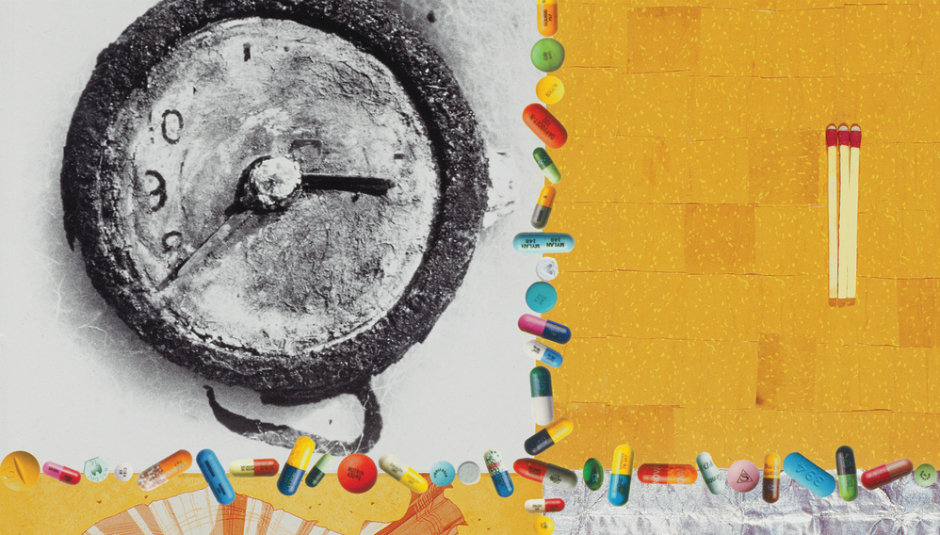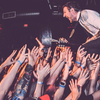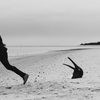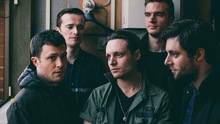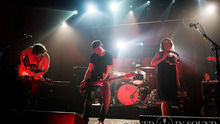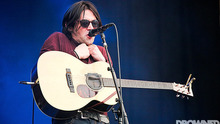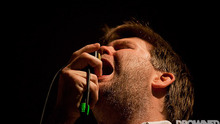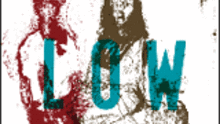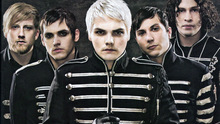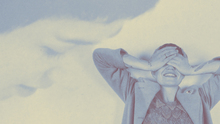After their recent announcement that after 20 long years, the legendary Emo/punk band Jawbreaker were reuniting to headline this year's Riot Fest, certain portions of the internet went into delirium while the rest watched on in bemusement. To those under Blake Schwarzenbach and co's spell, and there are many, the idea that Jawbreaker would be playing again to an entirely new generation who have since also fallen, is a truly remarkable one. Given the band's dramatic fall from grace, it can be argued that, while they probably will be paid handsomely, like all your other beloved reformed 90s acts, this truly is a victory lap of a brilliant career cut all too short by an increasingly cynical music business in which the band were victims of their own success.
For the uninitiated, "Jawbreaker" are generally what people mean when they say "back when Emo used to be a good and respectable label". I hesitate to call Emo a "genre", largely because it’s a label that was largely applied retrospectively, or if it was used at the time, pretty much every band distanced themselves from it. Broadly speaking, however, "Emo" in the late 80s and throughout the 90s meant “emotional punk music", a trend in punk that mutated out of the DIY indie and punk scenes across American in the 80s which would eventually lead to its explosion in 1991 with the release of Nevermind. The conception of "Emo" is generally attributed to 1985 (a.k.a "Revolution Summer"), the year Ian MacKaye, previously of Minor Threat, formed Embrace, as well as his Washington D.C peer and future Fugazi band mate Guy Picciotto's band Rites Of Spring releasing their only album on Discord Records.
Jawbreaker formed in 1986 after childhood friends Blake Schwarzenbach (guitars/vocals) and Adam Pfahler (drums) moved from Santa Monica, California to attend New York University and met Chris Bauermeister (Bass). After a couple years scrapping around trying to find their sound, Jawbreaker, wrote 'Shield Your Eyes' (which eventually ended up on the band's second album, 1992's Bivouac) and settled on a sound which combined East coast cynicism and self-reflectiveness with the West coast's harder-tinged, "pop-punk" sound of Black Flag and Descendents.
Perhaps more than any other band around in the early 90s (and arguably since) Jawbreaker were the ultimate cult band. They grew an underground following just prior to Nirvana's explosion and grew on it with each release and tour year on year, including supporting the Seattle alt-rockers on the West coast section of their In Utero tour. They released three increasingly great albums (1990's Unfun, 1992's Biouvac and 1994's 24 Hour Revenge Therapy) while moving between three similarly great cities, New York, Los Angeles, and finally San Francisco, the band's final resting place and true spiritual home.
Jawbreaker's debut is largely a straight-up pop-punk album, written while still at NYU and recorded in LA, and nearly broke up the band due to all the travelling before graduating. It does, however, feature one of the band’s, and indeed genre's, best songs in the lustful opener 'Want', a song that immediately introduced Schwarzenbach's mix of poeticism and human condition exposition. Meanwhile, Bivouac saw the band commit to San Francisco as their home after their falling our and showed the band's willingness to experiment with their sound to create a far darker and more sinister listen. While 'Chesterfield King' is the album's poppier single, the trio would experiment with song structures and sounds on tracks like 'P.S New York is Burning' and the album's title track.
All the while, the band were honing their craft as a tight, three-piece unit, pushing themselves beyond simple three-chord odes with subtler techniques as well as Schwarzenbach's insightfulness as a lyricist and confidence as a frontman, despite his rapidly declining vocal chords forcing him to strain his vocals further and further. Such advances are most obvious on the band's brilliant single 'Kiss The Bottle', a track written for a compilation about San Francisco's Mission District detailing its various faded dreams in a dirty, yet romantic, nightmare.
The literal movement the band undertook to find themselves is everywhere in their music; their song's characters (often observed by Schwarzenbach himself) are constantly moving from place to place, trying and failing to be fulfilled in the streets of America's major cities, much like those found in Kerouac or Springsteen. Musically, the band were tough sounding, despite Schwarzenbach's exposed, pained words spread across them, which gave them an audience interested in harder, punk-rock sounds without the macho posing so prevalent around mainstream bands at that time.
After their stint with Nirvana, Jawbreaker were ready to take on the world. They followed suit, travelling to Chicago to record their third album, the seminal 24 Hour Revenge Therapy, with Steve Albini. They had, at this point, mastered their craft, and the result was eleven perfectly executed, meaningful, heartfelt rock songs which seemed to speak to the crisis of a disenfranchised generation, much like Morrissey a decade prior. Schwarzenbach sang about the falseness of "the scene" on the band's ulimate pop-punk anthem 'Boxcar', about their now established home city's decay on 'Condition Oakland', and about utter rejection on 'Ache'. Perhaps no better example can be found of his abilities to capture a certain feeling, all the while having a tremendous band behind to back him up, than on the stunning 'Do You Still Hate Me?', a make-up/break-up anthem that any love-lost fool can relate with at some point in their life.
By the album's release in 1994, Jawbreaker were practically underground royalty, completing tours across the US and Europe. To many, they were the real deal, a band who weren't part of the major league farm which was by this point systematically churning out attempts to find the next Kurt Cobain. A week prior to 24 Hour Revenge Therapy's release, another highly notable Californian pop-punk band, Green Day, released their breakthrough Dookie and the similarities it bared to Jawbreaker's earlier, poppier moments didn’t go unnoticed by the indie band's loyal fanbase. Indeed, it seemed to strengthen the intensity of their admiration for Jawbreaker as "the band who represents the rest of us".
However, some "scenesters", aware of what was becoming of the DIY scene they believed they had built from a genuine place, were already catching on with Jawbreaker's success. Despite 24 Hour Revenge Therapy's success as an independent release, both critically and commercially, it was shared along with California's Offspring's Smash (still the best selling "independent record" of all time), Jawbox's For Your Own Special Sweetheart, and Sunny Day Real Estate's Diary as another early staple of "Emo". With the Nirvana tour, recording with Steve Albini (who initially went uncredited for fear of rejection), and the general climate of punk-rock music in 1994, the tide was feared to be turning.
Eventually, the inevitable call came, and despite another attempt to break-up during more tensions through exhaustion, Jawbreaker were approached by Geffen Records, who were looking to fill a rather large Nirvana shaped hole in late 1994/1995. Jawbreaker saw the success of their peers and thought they had paid their dues and earned some wider recognition. As a result, the band's final album Dear You was recorded with Rob Cavallo (who had produced Dookie a year earlier) in Los Angeles and the rest is somewhat history.
Time has, thankfully, been a lot kinder to Dear You than its initial reaction. Posited as the "thinking man's Green Day", Jawbreaker were being primed to be the next big thing in alt-rock, with PR knowing they had the fanbase already there to support them. However, that fanbase completely rejected Dear You from the get-go. Seen as the "ultimate sell-out album" at the time, Jawbreaker's passionate followers turned their back (literally, at a famous show in their native San Francisco) on the band's cleaner sound, as they utilised bigger production values and Schwarzenbach's smoother voice as a result of necessary vocal surgery before the album's recording.
On a mainstream level, Dear You wasn't a success either. Despite a support tour for the then young Foo Fighters, the band were seen as "too smart, and too self-pitying" for wider audiences, regardless of Green Day comparisons, who by this point had completely eclipsed their peers, and "not clever or heartfelt enough" for the audience who got them there in the first place. It was an extremely upsetting end to a band who only a couple years earlier were probably the most beloved and respected band in alt-rock music, especially given the fact that Dear You, once the dust settled, easily ranks as strong as their previous two albums and in places (whisper it) is even better.
The band unsurprisingly split up, frustrated with each other and the reaction they had received from their so-called loyal fanbase. Blake Schwarzenbach went on to have a decent afterlife in Jets To Brazil, while the others pursued their own personal projects. In the latter half of the 90s, indie/punk music slowly returned back to its DIY roots as alt-rock got bigger and bloated and the post-Kurt Cobain sheen wore off. Then, at the turn of the millennium, nearly five years after Jawbreaker's demise, a new generation of bands came along writing "Emotional hardcore" and citing Jawbreaker as their main influence. To some extent, their influence could be felt in The Dismemberment Plan, American Football, Built To Spill, and most notably, Jimmy Eat World and At The Drive-in, leading to a whole new generation of fans discovering Jawbreaker after the commotion had quietened.
As the years have gone on and the popular conception of "Emo" became a mainstream property, Jawbreaker's name kept getting brought up as pretty much every punk-rock musician's go-to influence to in interviews and cover versions (even Foo Fighters would go on to cover 'Kiss The Bottle' as a b-side to 2005's 'Best Of You'). Eventually, people mellowed out on the idea that their final album was such a disaster and slap in the face to matured fans who eventually realised maybe it was them who were being a bit immature. Ultimately, the everlasting appeal of Jawbreaker has become stronger since their sad demise and it’s not at all surprising to discover their reunion has finally been announced, some 21 years later. Regardless of whether the news came as a surprise, the opportunity for this incredible band to perform these universally stunning songs at all is a truly mouth-watering prospect. Let's just hope they're allowed to play Dear You without the crowd turning on them.

